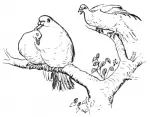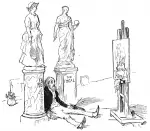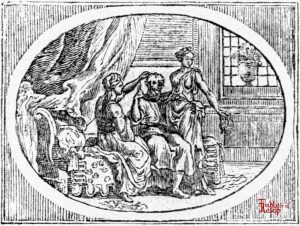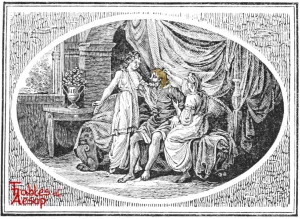A man had two wives; one older and one younger. Being vain, the younger pulled white hairs from the man’s head and the older pulled dark. He went bald.
Yield to all and you will soon have nothing to yield.

Eliot/Jacobs Version
In the old days, a middle-aged Man had one wife that was old and one that was young; each loved him and desired to see him like herself. The Man’s hair was turning grey, which the young Wife did not like, as it made him look too old. So, every night she picked out the white hairs. But, the elder Wife did not like to be mistaken for his mother. So, every morning she picked out as many of the black hairs as she could. The Man soon found himself entirely bald.

Caldecott
A Man whose hair was turning gray had two Wives, one young and the other old. The elderly woman felt ashamed at being married to a man younger than herself, and made it a practice whenever he was with her to pick out all his black hairs; while the younger, anxious to conceal the fact that she had an elderly husband, used, similarly, to pull out the gray ones. So, between them, it ended in the Man being completely plucked, and becoming bald.

JBR Collection
In a country where men could have more than one wife, a certain man, whose head was fast becoming white, had two, one a little older than himself, and one much younger. The young wife, being of a gay and lively turn, did not want people to think that she had an old man for a husband, and so used to pull out as many of his white hairs as she could. The old wife, on the other hand, did not wish to seem older than her husband, and so used to pull out the black hairs. This went on, until between them both, they made the poor man quite bald.

Samuel Croxall
A MAN, in times when polygamy was allowed, had two wives: one of which, like himself, had seen her best days, and was just as it were entering upon the declivity of life; but this, being an artful woman, she entirely concealed by her dress; by which, and some other elegant qualities, she made a shift sometimes to engage her husband’s heart. The other was a beautiful young creature of seventeen, whose charms, as yet in the height of bloom, and secure of their own power, had no occasion to call in any artifice to their assistance. She made the good man as happy as he was capable of being, but was not, it seems, completely so herself: the grey hairs, mixed among the black, upon her husband’s head, gave her some uneasiness, by proclaiming the great disparity of their years; wherefore, under colour of adjusting and combing his head, she would every now and then be twitching the silver hairs with her nippers; that, however matters were, he might still have as few visible signs of an advanced age as possible: the dame, whose years were nearer to an equality with his own, esteemed those grey locks as the honours of his head, and could have wished they had all been such; she thought it gave him a venerable look; at least, that it made her appear something younger than he: so that every time the honest man’s head fell into her hands, she took as much pains to extirpate the black hairs as the other had done to demolish the grey. They neither of them knew of the other’s design; but each continuing her project with repeated industry, the poor man, who thought their desire to oblige put them upon this extraordinary officiousness in dressing his head, found himself, in a short time, without any hair at all.
THE APPLICATION
Phaedrus, whose sense I have generally followed in every fable of which he has made a version, in his application of this, is a little severe upon the ladies; and tells us, that by this example we may see, the men are sure to be losers by the women; as well when they are the objects of their love, as while they lie under their displeasure. All that I shall add to what he has said, is to observe, that many women may unfortunately, out of a pure effect of complaisance, do a thousand disagreeable things to their husbands. They, whose love is tempered with a good share of good sense, will be sure to have no separate views of their own, nor do any thing more immediately relating to their husband, without consulting him first. In a married state, one party should inform themselves certainly, and not be guessing and presuming what will please the other; and if a wife uses her husband like a friend only, the least she can do, is first to communicate to him all the important enterprises she undertakes; and especially those which she intends should be for his honour and advantage.

Thomas Bewick (The Man and His Two Wives )
A Man, in times when polygamy was allowed, had two wives, one of whom, like himself, had seen her best days, and was verging upon the decline of life, but possessed many engaging qualities. The other was young and beautiful, and shared the affection of her husband, whom she made as happy as he was capable of being, but was not completely so herself. The white hairs mixed with the black upon the good man’s head, gave her some uneasiness, by proclaiming the great disparity of their years; wherefore, under colour of dressing his head, she plucked out the silver hairs, that he might still have as few visible signs of an advanced age as possible. The older dame, for reasons directly opposite, esteemed these grey locks as the honours of his head, and thought, while they gave him a venerable look, they made her appear something younger, so that every time she combed his head, she took equal pains to extirpate the black hairs. Each continued her project, unknown to the other, until the poor man, who thought their desire to oblige him put them upon this extraordinary officiousness in dressing his head, found himself without any hair at all!
APPLICATION.
As Christianity has banished polygamy, no immediate moral can be derived by husbands from this Fable, unless we conclude, that it is as impossible to serve two mistresses as two masters; for whatever we do to please the one, will probably offend the other. To conciliate the affections of persons whose tempers are opposite, is extremely difficult, if not impracticable. To wives it may teach, that those whose love is tempered with a tolerable share of good sense, will be sure to have no separate views of their own, nor do any thing immediately relating to their husbands, without consulting them first. All that we shall add to what has been said, is to observe, that many women may ignorantly, out of a pure effect of complaisance, do a thousand disagreeable things to their husbands. But in a married state, one party should not be guessing at or presuming, but inform themselves certainly, what will please the other; and if a wife use her husband like a friend only, the least she can do is first to communicate to him all the important enterprizes she undertakes, and especially those which she intends should be for his honour and advantage.

Townsend version
A middle-aged Man, whose hair had begun to turn gray, courted two women at the same time. One of them was young, and the other well advanced in years. The elder woman, ashamed to be courted by a man younger than herself, made a point, whenever her admirer visited her, to pull out some portion of his black hairs. The younger, on the contrary, not wishing to become the wife of an old man, was equally zealous in removing every gray hair she could find. Thus it came to pass that between them both he very soon found that he had not a hair left on his head.
Moral
Those who seek to please everybody please nobody.

L’Estrange version
It was now cuckow-time, and a certain middle ag’d man, that was half-gray, half-brown, took a fancy to marry two wives, of an age one under another, and happy was the woman that could please him best. They took mighty care of him to all manner of purposes, and still as they were combing the good man’s head, they’d be picking out here and there a hair to make it all of a colour. The matronly wife, she pluck’d out all the brown hairs, and the younger the white: so that they left the man in the conclusion no better then a bald buzzard betwixt them.
Moral
‘Tis a much harder thing to please two wives then two masters; and he’s a bold man that offers at it.

Concubinae Duae
Senex, cuius caput respersum iam erat canis, habebat concubinas duas, moribus et aetate dissimiles, nam altera iuvencula et lascivior, altera aetate provecta et severior erat. Ut igitur ad harum alteram forte accesserat, ita crines non similes suis dormienti vellebantur. Carpebat enim iuvencula albos, senior vero nigros. Tandem ille calvo capite omnibus risui fuit.
Perry #031





